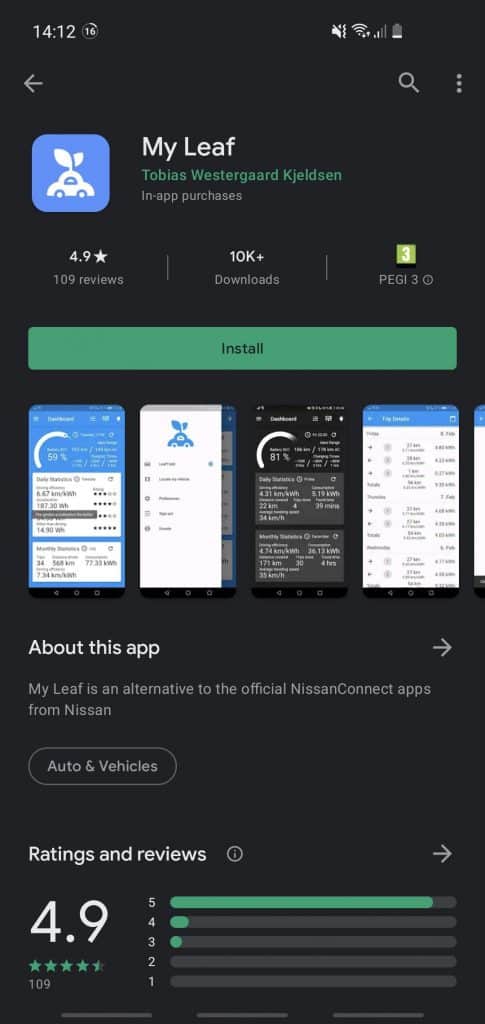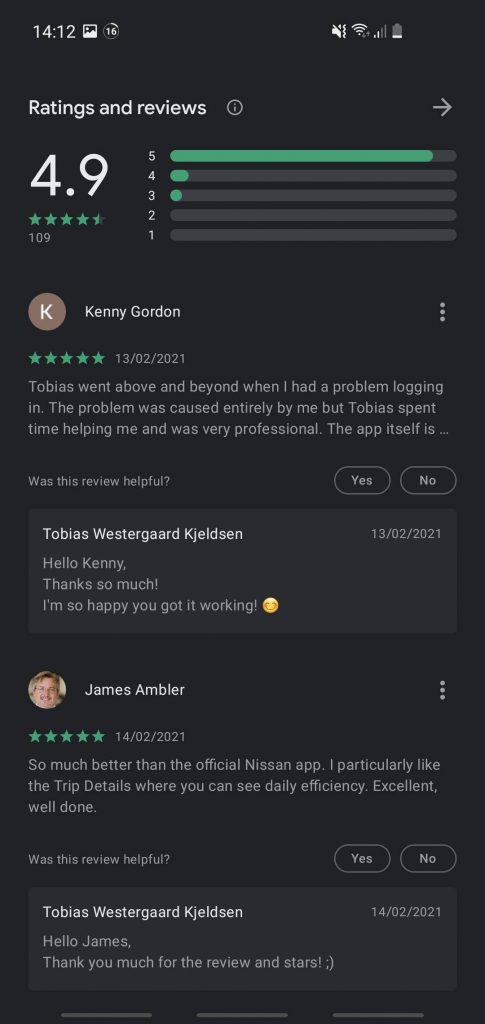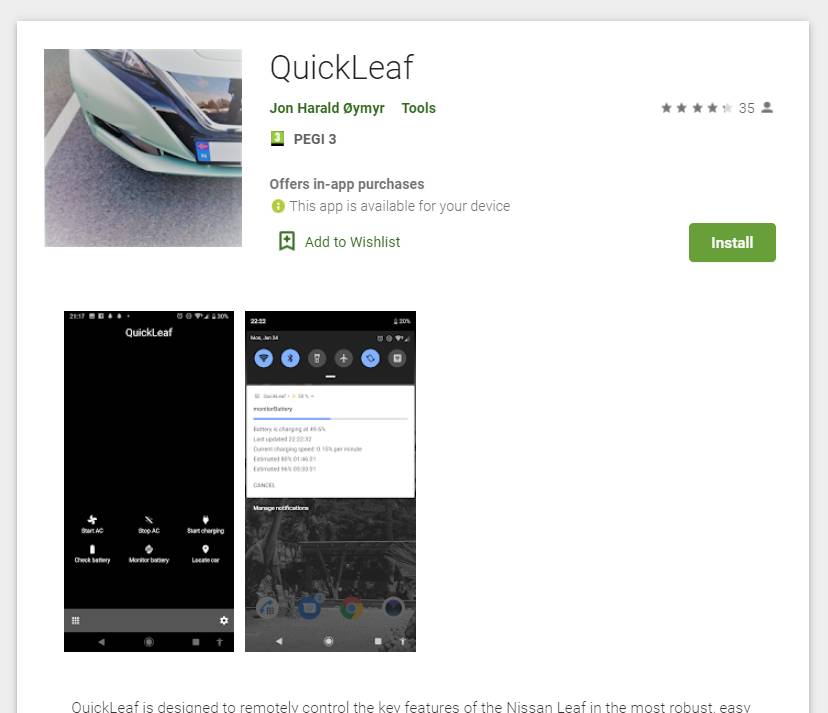In a previous article, we outlined some of the fundamental issues that users were having with the official NissanConnect EV app for smartphone and smart watch. This app is currently available on both Google Play and the Apple App Store, but unfortunately has failed to even exceed 2 stars after thousands of negative user ratings and reviews.
Frustrated users complained about connectivity, lack of response from the technical support team, inability to update and then crashing after performing updates…the list goes on. It was summed up by many commentators as simply, “It doesn’t work.” In today’s blog, therefore, we are exploring third-party solutions that have already been created and released to solve the problem, most notably My Leaf.
My Leaf

My Leaf is our focus app in today’s blog, but we will also look into other third-party apps later in the piece. My Leaf was first released back in 2018 in the wake of a tidal wave of scathing reviews of Nissan’s official NissanConnect EV app. The official app was dogged by complaints of it connecting slowly, being impossible to login, not responding to climate controls and much more. The My Leaf app contains all the same functions as Nissan’s appl but even with a few updated features like detailed trip history.
The creator of My Leaf is called Tobias Kjeldsen, and part of the reason that his app has achieved a rating of 4.6 after 526 reviews (unlike Nissan’s 1.7 after more than 5,000 reviews) on Google Play is that users love his hands-on approach.
My Leaf: Features
The main features of the app are as follows:
- Battery statistics: These include the current charge status and the available range
- Charging Control: Allows for scheduling and remote starting charge
- Climate Control: Allows driver to set the interior temperature remotely and establish inner environment remotely
- Vehicle Location
- Detail trip history: with stats on distances traveled, power used, etc.
- Daily Statistics: Helps you to understand your power usage and efficiency each day, which you can use to alter habits and boost efficiency
My Leaf: Requirements
If you are reading this and already heading to Google Play or the Apple App Store to install this alternative, you should first be aware of some requirements. Firstly, and arguably the most important requirement is that you need an existing NissanConnect account for My Leaf to work properly. Some users have complained that the app doesn’t automatically connect to their car, but the main reason for that has been that the user has not set up the NissanConnect account on the official app. You’ll need your Nissan app login info to use My Leaf properly. Don’t skip that step.
Secondly, besides having a NissanConnect account, you must also have an active subscription with them. If you don’t, then My Leaf won’t work. Finally, ensure that you are using the latest-available version of your smartphone’s operating system to ensure that the updated app will continue to work properly.
My Leaf: Problems & Limitations

Whilst the My Leaf app has some great reviews, the creator of My Leaf doesn’t shy away from being honest about some of the issues with his app. First of all, he points out to users that because his app relies on the same API as the NissanConnect EV app, that when NissanConnect is having issues, so too does his app.
While My Leaf solves many of the immediate problems like connectivity, access to data and right-here right-now functionality — which is what users have said they like — it is vulnerable to fundamental problems with the NissanConnect system. They are inextricably linked, which means that if for whatever reason NissanConnect is down or not working properly, then your My Leaf app won’t work either.
This issue doesn’t seem to stop the vast majority of its users from having a positive user experience. The other drawback is that to get the most out of the app you will have to pay some money. On the APP store, the app is currently about $1 to download, and then there are some additional in-app purchases you can make. If this bothers you, then you’ll have to stick with Nissan, but if not then be prepared to spend a little to get all the features.
My Leaf: Warranty
Some raise the question of whether or not using a third-party app would impact the car’s warranty. In this case, using My Leaf doesn’t impact your car’s warranty. The warranty is only voided when you make unauthorized modifications or add non-approved third-party components to your car. In this case, you are not doing that.
My Leaf requires an active NissanConnect subscription account to work properly. In this sense, it is more of a supporting app rather than a stand-alone or a new component that you have installed to replace an old one. It doesn’t replace NissanConnect, but merely provides a better platform through which it can work.
Other Nissan Leaf Third-Party Apps
My Leaf is certainly among the most successful and popular third-party alternatives to the official NissanConnect app, but it is by no means the only one out there. One of the reasons that My Leaf has enjoyed success is that it follows Nissan’s own API. This is why it has continued to work even when Nissan updated the API, at which point some other alternative apps stopped working. Here are some other options should you wish to explore them:
Leaf Spy Pro ($14.99 on Google Play)
This app has received a total of 3.7 stars on Google Play after 581 reviews at the time of writing this blog. In general, it’s viewed as a strong alternative to NissanConnect, though it doesn’t offer the same kinds of control functions. This app is actually designed to work together with an OBD-II Bluetooth adapter to provide you with diagnostic information that usually only the dealership would have access to.
It tells you the current voltage in each battery cell, the battery temperature, odometer readings, charge level and more. It is therefore a good app for those who perhaps aren’t as interested in remote functions but want to keep an eye on the health of their car’s battery. This makes it a good choice for the more technically minded Leaf driver.
Users have praised the app’s features, but have also mentioned that it can be a little fiddly at first and the UI is not the most intuitive. They also point to the high price point to get the pro version.
QuickLeaf (Free on Google Play)

This app is quite similar to My Leaf app in that it offers an alternative to remote controlling your Nissan Leaf. It allows you to control the AC, check the battery status, start the charging process remotely and more. It does follow Nissan’s API so it is still functioning at full capacity, and like My Leaf it requires users to have an active NissanConnect account and login info to work properly.
Users have rated it 4.3 stars after 277 reviews. They praise its simplicity and visually pleasing UI in particular. They also remark that like My Leaf, it is far faster and more reliable than the official Nissan app. The main drawbacks of the app seem to be in its somewhat limited functions, and there are some users who say they get error messages when trying to use the AC controls, but these are also minor faults resulting in 4 stars rather than 5 stars.
Control App for Nissan Leaf ($3.99 on Google Play)
This app offers you a way to reliably monitor your Nissan Leaf charging and alerts you when the Leaf has reached its optimum charge rate. You can also remotely control the AC either immediately or via scheduled activation and deactivation, which allows you the luxury to set up your environment settings in advance and then just sit back and wait for them to happen as you need them.
It has a pretty solid 4.3-star rating on Google Play after 34 reviews. Users have commented that the climate control function isn’t working as it should but you could expect those to be fixed by the creators at some point. As with My Leaf, some users also pointed to occasional clunky or slow performance, but this is once again due to problems in Nissan’s own API infrastructure.
Leaf Connect (Free on Google Play)
This is a nice free option for battery monitoring and for scheduling charge and climate controls. We thought we’d include this one in the list since the creator points out quite clearly that it doesn’t work on Leaf models from 2019 onwards. It’s a good option if you have an older Leaf.
It’s rated at 3.7 stars after 62 reviews. There have apparently been some issues with the login and region settings that the developer is working on. Other than that, it’s a solid, free option.
Conclusion: Best Alternative to NissanConnect?
In our view, My Leaf still offers the best all-round alternative to NissanConnect EV. Other apps offer some different things to those who seek particular functions, but for a more comprehensive app and like-for-like replacement of NissanConnect EV, My Leaf is the best-performing option.
Whichever app you end up using, be sure that it’s compatible with your Nissan’s model year. The apps with most functionality are the ones that follow Nissan’s own API. Those that don’t follow it can’t provide anything like the same function. To that end, which ever app you choose that follows Nissan’s API is also subject to Nissan’s system infrastructure failings. Remember that before you bash the app for being slow or having connection problems one day.